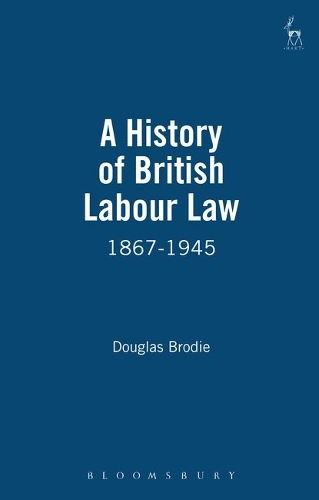
A History of British Labour Law: 1867-1945
(Hardback)
Publishing Details
A History of British Labour Law: 1867-1945
By (Author) Douglas Brodie
Bloomsbury Publishing PLC
Hart Publishing
17th September 2003
United Kingdom
Classifications
Tertiary Education
Non Fiction
Social and cultural history
344.410109
Physical Properties
Hardback
266
Width 138mm, Height 216mm, Spine 21mm
Description
In the UK the received wisdom has tended to be that, historically, British labour law was abstentionist or non-interventionist, best epitomised by the words of Lord Wedderburn who has written that "collective bargaining has developed in a system which depends very little on the law, which is covered by very few decisions of the judges, and which is controlled by statute very little, if at all". It is not until we reach the Industrial Relations Act 1971 that we discover the first attempt in peacetime to move to a legally regulated system. However, the accuracy of this non-interventionist depiction appears to very much depend on the period which is examined, which is why an historical perspective is needed in order to understand the significance of the current shape and scope of British labour law. The aim of this work is to re-examine the received interpretation concerning British labour law, by looking at both the role given to law, and that anticipated and argued for it, during the most formative period of its development - the period between 1867 and 1945. The book also revisits the debate about war-time legislation which has tended to be viewed as standing apart from mainstream labour law but which the author demonstrates to have important linkages to the past and present.
Reviews
Brodie's book covers more than just the 1906 Act and the experiences of the two world warsIt is a detailed elaboration of the provisions of the law since 1871 until 1945, and deals not only with collective bargaining, but also legal regulation of conditions of employment -- Richard Whiting * The Irish Jurist, Vol 34 *
Brodie's coverage of the period is much wider than simply an analysis of trade union law and industrial conflictThere is much more besides Brodie's book sheds new light and provides a different perspective to a critical period in the development of British labour lawthe way he approaches the subject and his willingness to challenge previous orthodoxies make this an important work. It should be read by anyone who has wondered why the shape of British labour law is so different in important aspects from that of other developed countries. -- Kenneth Miller * The Edinburgh Law Review, Vol 9 *
This is a timely and useful book... confronts the formative history of our labour law with an honest determination. In educational terms, it is far more important that a labour law student should read this book than that he or she should know the latest tribunal decision on unfair dismissal. -- Lord Wedderburn * Historical Studies in Industrial Relations *
One important issue which attracts much academic interest is the question of the 'national character' of a labour law system its origins, strengths and weaknesses. Douglas Brodie's account of the historical foundations of British labour law is important for re-opening the debate about the nature and achievements of that system. -- Richard Mitchell * Australian Journal of Labour Law *
Author Bio
Douglas Brodie is a Senior Lecturer in Law at the University of Edinburgh.
